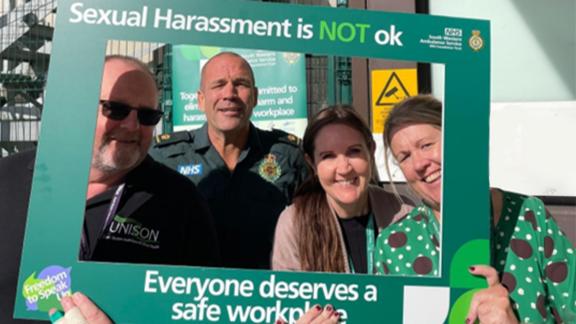A partnership approach to embedding sexual safety

Overview
The NHS is not immune to societal challenges, including sexual harassment. In response to feedback from staff, South Western Ambulance Service NHS Foundation Trust (SWASFT) and trade reps decided to commit to a zero-tolerance approach to sexual harassment and foster a more positive workplace culture, recognising that working in partnership on this would be crucial.
The trust signed the NHS Sexual Safety Charter and went on to update its sexual harassment policy and processes to tackle the increased caseload. The trust is now sector leading in quality and turnaround of cases arising from sexual misconduct.
The issue faced
In February 2023, the trust introduced its own Sexual Safety Charter ahead of signing NHS England’s Sexual Safety Charter, launched in September 2023. This was announced in a letter signed by the organisation’s executive directors and in a video featuring its chief executive and executive director for people, alongside freedom to speak up guardians and trade union reps, who each described their hope for the work.
The campaign was massively successful but, as reporting increased, investigations became lengthy, casework became increasingly complex and multifactorial, implementing a just and learning culture became more challenging and staff wellbeing was negatively impacted.
The actions taken
SWASFT employer and trade union colleagues saw the need to reflect on the trust’s misconduct policy and processes in light of the impacts being experienced around organisational culture and wellbeing.
SWASFT’s just and learning culture forum, which includes representation from its people partner team, operational leaders and trade union reps, met every three months for open, safe and impactful discussions about the new policy and processes, enabling continuous improvement in all aspects of managing sexual safety cases.
The trust introduced internal sexual safety training prior to the rollout of national training in April 2024 and linked with UNISON’s National Ambulance Occupational Group to offer its national, sector-specific sexual safety training programme. All of the trust’s UNISON reps also undertook training, which covered encouraging staff to speak up on sexual harassment, managing reports of sexual misconduct with empathy and sensitivity, and looking after themselves.
The trust’s senior leaders hosted panels to encourage speaking up and further embed a zero-tolerance approach to sexual harassment. The trust also shared examples of lived experience, ensured awareness of the consequences of sexual misconduct for perpetrators, and enhanced its support offer for colleagues who speak up and those progressing through a formal investigation.
Employers and trade union reps meet with the trust’s chief executive monthly to share any issues and stay connected. Dedicated investigating officers were introduced to manage the increased workload, with great success.
Results and benefits
- Formal investigations resulting from sexual harassment rose from two in 2021/22 to 66 between February 2023 and October 2025.
- Introducing dedicated investigating officers has reduced the length of investigations from an average of four months to nine weeks.
- The trust has so far obtained formal investigation impact statements from 100 per cent of victims of sexual misconduct.
- The trust’s Sexual Safety Charter has been viewed online more than 100,000 times since February 2023.
Social partnership working: lessons learnt
- The trust feels it would not have achieved the above results without partnership working.
- Working alongside trade union reps helped to generate more engagement on the topic of sexual misconduct and ensure transparency.
- Having a common sense of purpose and a shared understanding of zero tolerance policies and processes, all underpinned through the principle of a just and learning culture, helped to ensure communications and approaches have been consistent.
Summary
- Through partnership working, SWASFT and trade union reps successfully embedded new policies, processes and training; raised awareness of the trust’s new zero-tolerance approach to sexual harassment; and encouraged reporting.
- Appointing dedicated investigating officers improved the quality of formal investigations and significantly reduced the length of cases.
- The trust’s approach to partnership working is transferable to other projects and the wider ambulance sector.
Further information
For more information on this project, contact Amy Beet, executive director for people, Lucy Manning, assistant director for people operations or Robin Hughes, UNISON branch secretary.



